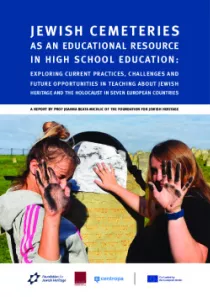This report of the Foundation for Jewish Heritage by Prof Joanna Michlic is part of an unprecedented initiative by the European Union to preserve and promote awareness of 1,700 Jewish cemeteries from seven countries in Eastern Europe, which is being implemented by three consortium partners - the Foundation for Jewish Heritage, the European Jewish Cemeteries Initiative, and Centropa.
These Jewish sites primarily represent ‘orphaned’ heritage. The communities that the cemeteries once served were mostly extinguished during the Holocaust. In many places, the Jewish cemetery remains as the last physical evidence of once thriving Jewish life. The vast majority are today in a parlous state, having suffered years of neglect and in instances complete destruction.
Indeed, the very existence of these Jewish communities has become largely marginalised and forgotten, which is why this EU project is of such critical importance. Not only does it address the preservation of cemeteries but it is preservation with a special purpose, to ensure that the Jewish life in towns and cities across Eastern Europe is recalled, understood, commemorated and celebrated.
Joanna’s brief was to address the specific educational potential of Jewish cemeteries - how Jewish cemeteries can serve as ‘outdoor classrooms’; a profound tool for teachers to use in educating their pupils on the local Jewish narrative. Her approach involved listening carefully to the voices from the region, and those with a particular interest and expertise in the subject. The result is a document that represents a significant statement on the current possibilities, while also addressing the challenges and the sensitivities at this time.
The Jewish experience inevitably touches upon what is now considered fundamental European values - of human rights, democracy, and the rule of law. Finding ways to engage with the Jewish legacy in Europe has a special importance for today.


